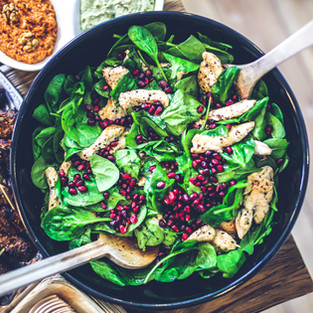5 ways to improve fertility naturally!
- Rebekah Loh

- Feb 23, 2020
- 4 min read

So you've started exploring the idea of starting a family, or maybe you're currently riding the highs and lows of trying to fall pregnant. The fertility journey is a great opportunity for individuals to be aware of their own health. However, it can be extremely frustrating and confronting for many people. Is there anything you or your significant other could be doing to help? Definitely! Here are 5 simple ways to improve your fertility through improving egg and sperm quality and increasing blood flow to your reproductive organs!
1. Eat better
You know it. I know it. And yet there isn't enough emphasis when it comes to eating better and the importance of digestive health in fertility. Having a diet high in refined carbohydrates and sugars (pasta, white bread, white rice, cereals, pizzas, pastries, cakes) has been shown to increase inflammation, irritable bowel disease (1). Ditch the refined carbs and embrace the whole grains and whole foods. Studies have shown that having a diet rich in fruits and vegetables with minimal processed foods can improve sperm quality and also enhance fertility. (2,3). Especially carrots, sweet potatoes, beets, avocados, parsnips, dill, celery, coriander & parsley. These particular foods aid the recruitment of your follicles.
2. Learn to manage your stress
Stress is unavoidable! But you DO have control over how you respond. Stress can drive up inflammation and oxidative stress in your body (4). All of these factors can lead to a decrease in fertility and viable pregnancy (5). In addition, trying to fall pregnant usually creates more stress for the individual and couple. So learning how to manage stress is paramount and it's a lifelong habit that you can benefit from. I usually suggest looking at a mindfulness activity that works for you. Yoga, walking, meditation, painting, journalling, reading, stretching, or qigong. And remember...TV and time on your phone are NOT a mindfulness activities.
3. Get moving
Did you know that the average person spends about 52 hours seated? Less movement and cardiac activity means that there is less healthy blood circulation. Prolonged sitting can lead to poor blood flow, particularly in the reproductive organs and pelvic region. In Chinese Medicine theory, lack of healthy blood flow can cause blood stagnation and poor organ function which can negatively impact fertility. I always recommend women to get into the habit of doing fertility yoga as it really gets the blood flowing to the lower abdominal area and has an added sedative and relaxation component .
4. Keep your feet warm
About 99% of women who come into my clinic have icicles for feet! To me this is indicative of poor blood circulation in the body and the inability of temp regulation which is actually very important in fertility. This is confirmed by research, where a bunch of rats had their little tootsies heated and they saw an increase in ovarian blood flow (6). So make sure you're wearing socks/slippers at home especially if you have tiled or wooden surfaces. Even having a foot soak or a bath every week is beneficial!
5. Try acupuncture and herbs!
Obviously I'm going to suggest this because I'm a Chinese Medicine practitioner. But hear me out. In my clinical experience I have seen many cases in which acupuncture and herbs have been beneficial in supporting women through IVF as well as women who have conceived naturally. Furthermore research has shown the myriad of positive effects acupuncture and herbs have on the body including increasing blood flow to the reproductive organs, balancing of hormones, digestive health as well as its sedative effects (7,8,9).

During my treatments, the acupuncture and herbs prescribed are tailored to each individual as no fertility case is exactly the same. In addition, I equip individuals with knowledge through educating them on lifestyle, diet recommendations and nutritional requirements. Most importantly, I have seen individuals go from being a passenger in the whole process, to being empowered, taking control of their own health and wellbeing, and in most cases being successful in falling pregnant.

So you've tried the first 4 options, but not sure about the 5th? Come and chat to me about your questions or concerns for 15 mins. Book here if you'd like an appointment.
References
1. Tomasello G, et al. Nutrition, oxidative stress and intestinal dysbiosis: Influence of diet on gut microbiota in inflammatory bowel diseases. Biomed pap Med Fac Univ Palacky Olomouc. 2016 Dec; 160(4):461-466.
2. Mendiola J, et al. Food intake and its relationship with semen quality: a case-control study Fertility & Sterility 2009 March 91(3) 812-818
3. Toledo E, et al Dietary patterns and difficulty conceiving: a nested case–control study Fertility & Sterility 2011 Nov 96 (5) 1149-1153
4. Ruder EH, Hartman TJ, Goldman MB. Impact of oxidative stress on female fertility. Curr Opin Obstet Gynecol. 2009;21(3):219–222. doi:10.1097/gco.0b013e32832924ba
5. Louis G.M., et al. Stress reduces conception probabilities across the fertile window: evidence in support of relaxation Fertility & Sterility. 2011 June 95 (7) 2184- 2189 doi.org/10.1016/j.fertnstert.2010.06.078
6. Uchida S et al. Effects of Thermal Stimulation, Applied to the Hindpaw via a Hot Water Bath, upon Ovarian Blood Flow in Anesthetized Nonpregnant Rats Journal of Phys Sci 2007 Aug 57 (4) doi.org/10.2170/physiolsci.RP003507
7. Paulus W.E., et al, Influence of acupuncture on the pregnancy rate in patients who undergo assisted reproduction therapy Fertility & Sterility 2002 April 77 (4) 721-724 doi.org/10.1016/S0015-0282(01)03273-3
8. Zheng H., et al. Comparison between the Effects of Acupuncture Relative to Other Controls on Irritable Bowel Syndrome: A Meta-Analysis. Pain Res Manag 2019 Nov doi: 10.1155/2019/2871505
9. Karatay S., et al. Effects of Acupuncture Treatment on Fibromyalgia Symptoms, Serotonin, and Substance P Levels: A Randomized Sham and Placebo-Controlled Clinical Trial, Pain Medicine, Volume 19, Issue 3, March 2018, Pages 615–628, https://doi.org/10.1093/pm/pnx263










Comments